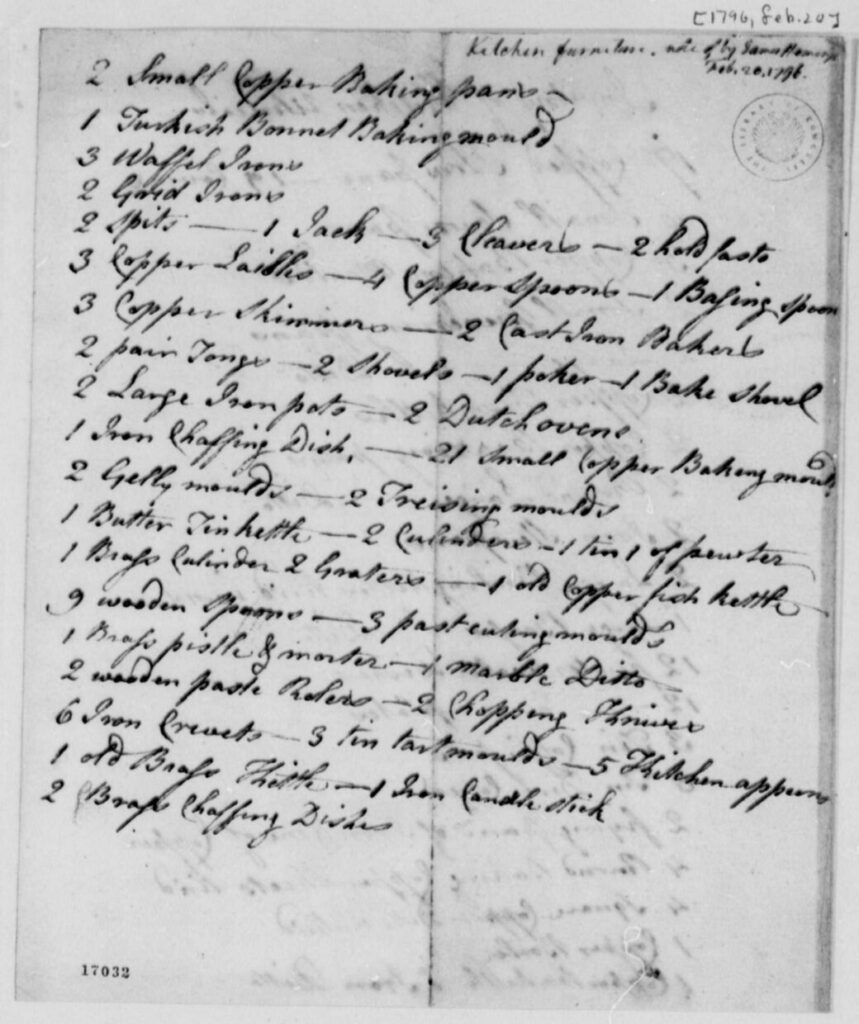These births, illnesses, and deaths must have been particularly difficult for these young enslaved women. Their positions at the White House kept them separated from their families and support systems back at Monticello. Frances was only able to see her husband twice a year when he transported supplies between Monticello and the President’s House. Their relationship certainly suffered the strain of distance. Like most enslaved couples, they were not legally married. Although marriages between enslaved people were recognized within their enslaved community, they were neither recognized nor protected by the legal system. On one visit, David and Frances got into “a terrible quarrel.” The fight between the two was so intense that Jefferson summoned the Monticello overseer, Edmund Bacon, to the White House. Upon arrival, Jefferson instructed Bacon to sell David and Frances in Alexandria, Virginia. When Frances and her husband realized the severe consequences of their fight, the pair approached Jefferson and “wept, begged, and made good promises, and made such an ado, that they begged the old gentleman out of it.”42
Edith and her husband Joseph also experienced the hardships of prolonged separation. In 1806, during Jefferson’s summer visit to Monticello, one of his accompanying staff from the White House delivered some disturbing news to twenty-six-year-old Joseph. Although it is unknown what kind of news Joseph received, it potentially involved his wife. He left Monticello’s blacksmith shop and set out for the White House on July 29, 1806. When Jefferson discovered Joseph’s flight from Monticello, he took action immediately and hired a man to pursue the runaway.43 Jefferson also wrote to his White House coachman Joseph Dougherty, “we know he has taken the road towards Washington, & probably will be there before the bearer. he may possibly trump up some story to be taken care of at the President’s house till he can make up his mind which way to go; or perhaps he may make himself know to Edith only, as he was formerly connected with her.”44 Several days later, on August 3, 1806, Dougherty replied that he had captured Joseph, “I met with him in the President’s yard going from the Presidents House…I took him immediately & brot. Him to Mr. Perry & has him now in jail. Mr. Perry will start with him tomorrow, for Monticello…”45 Apparently, Lemaire sympathized with the young man’s plight writing, “The poor unhappy mulatto got was not difficult to take, He well merits pardon for this.”46
When Jefferson’s time in the White House came to an end, he made arrangements for Edith and Frances to return to Monticello. In March 1809, Edith, Frances, and their children departed the White House with a train of three wagons bound for Monticello led by Edmund Bacon and Frances’s husband, David. Shortly after their arrival, Honoré Julien arrived to help establish the kitchen at Monticello. At this point Peter Hemings transitioned out of his role as Monticello’s head cook and instead focused on brewing. After two weeks Julien departed from Monticello, leaving Edith as head chef, well prepared with her seven years of training at the White House. Frances continued to assist Edith in food preparation and the pair ran the Monticello kitchen for the remainder of Jefferson’s life. Jefferson’s guests often praised their fine cooking. In 1824, Daniel Webster famously recorded, “dinner is served in half Virginian and half French style, in good taste and abundance.”47
Upon Jefferson’s death in 1826, Frances and David were sold along with their eight children at the 1827 estate sale at Monticello in order to pay off Jefferson’s exorbitant debts. However, Edith and Joseph had a different story. Joseph was one of the few enslaved people freed in Jefferson’s will, while Edith and their ten children remained enslaved. At the estate sale, Edith and two of her children were purchased by Joseph’s brother-in-law Jesse Scott, a free man of color. By 1837, Joseph had saved enough money from his blacksmith shop’s earnings to buy his wife, five of their children, and four of their grandchildren. Edith and her family eventually settled in the free state of Ohio.48 At long last, Edith was able to experience freedom after her many years of forced servitude preparing French cuisine in the White House and Monticello kitchens.
Thank you to James B. Conroy, author of Jefferson’s White House: Monticello on the Potomac, for his contributions to this article.

